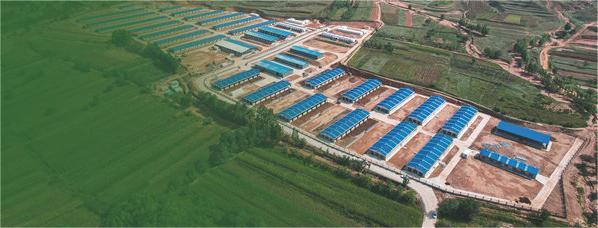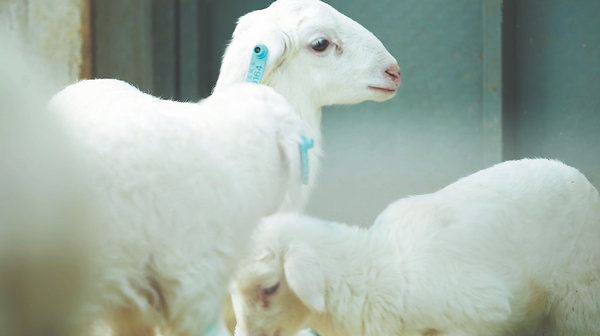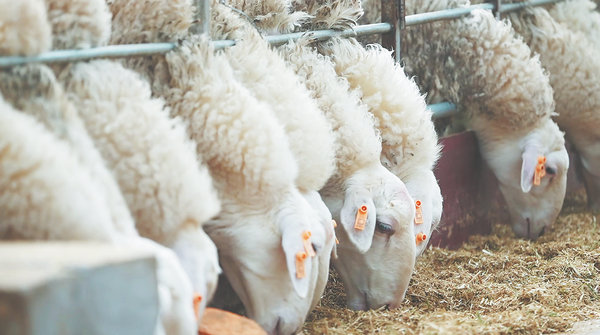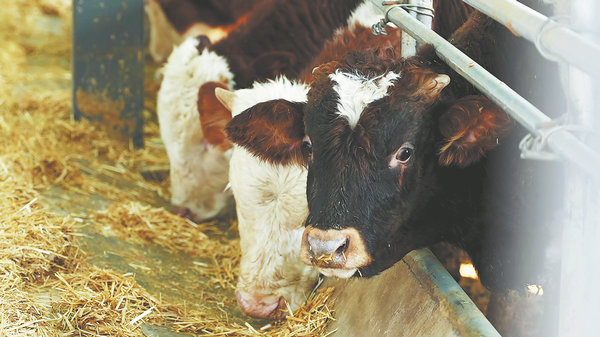
The Jishishan Cattle and Sheep Breeding Center covers approximately 13.07 hectares and features dozens of sheds. [Photo/WANG HU/FOR CHINA DAILY]
At the end of 2023, a severe earthquake hit Jishishan in Gansu province, destroying local farmlands and collapsing cattle and sheep sheds, leaving the area in urgent need of reconstruction.
In response, 31-year-old Lu Xiaopeng arrived to help establish the Jishishan Cattle and Sheep Breeding Center, aiming to revitalize the local livestock industry.
Lu, a graduate of animal husbandry and veterinary medicine, had previously worked on a farm, in an animal hospital, and at a seed company. Upon being appointed head of the center, he brought advanced breeding and management expertise to the region.
Lu led a newly recruited team of 24 local employees, including five recent university graduates, to build the largest farm in the area from the ground up.
Under the leadership of the local government, construction of the breeding center began in early April 2024, and it officially started operations by mid-July.
With a total investment of 36.59 million yuan ($4.99 million), the center spans 196 mu (approximately 13.07 hectares). It includes 11 cattle sheds and 14 sheep sheds, currently housing 4,250 sheep and 800 cattle.

Lu Xiaopeng works at the breeding center. [Photo/LI YANG/FOR CHINA DAILY]
"We have achieved the goal of becoming operational in the same year as construction," said Lu.
Lu joined the breeding center just a few months after the earthquake. In the livestock industry, there were few local professionals, creating an urgent need for experts.
There was also a personal reason for Lu: being from the Gannan Tibetan autonomous prefecture, not far from Jishishan, this job allowed him to work close to home.
"This is an important platform, as there has never been such a large breeding center here before. I see it as an opportunity for my career development," he said.

The cattle and sheep raised at the center. [Photo/SONG LEILEI/FOR CHINA DAILY]
Benefiting locals
According to Lu, the goal of the breeding center is to help over 2,000 households in Jishishan increase their income and achieve prosperity. Most of these households are from Chenjia village and Sibaozi village, both of which were significantly affected by the earthquake.
Farmers can purchase high-quality cattle and sheep from the center at prices lower than the market rate. The center then buys back the calves and lambs at prices higher than the market rate.
Throughout the breeding process, the center provides technical support, including nutritional formulas, artificial insemination for cattle and sheep, as well as disease prevention and health care.
"In simple terms, it's about enabling farmers to raise livestock without worries and sell with confidence," Lu said.
The center also benefits local households by purchasing their forage, subsidizing land transfer fees, and offering them shares with dividends.
"Every inch of the breeding center belongs to the nearby villages. The 196 mu of land was entirely transferred from these villages, and we pay 800 yuan per mu each year," he elaborated. "The local government has allocated shares to 732 households affected by the disaster, giving each household 50,000 yuan in shares. With a 2 percent dividend, the center provides an annual payout of 1,000 yuan to each household."
The center also creates job opportunities, especially for local young people. All of the center's employees are residents affected by the disaster. By working here, they gain both technical skills and higher incomes.

The cattle and sheep raised at the center. [Photo/SONG LEILEI/FOR CHINA DAILY]
Empowering talent
In Lu's view, the key to revitalizing rural areas is to attract young people and college graduates to return and work in their hometowns.
He mentioned that the main workforce in Jishishan's agricultural production consists of people born in the 1950s and 1960s, and many young people are reluctant to return to rural areas due to lifestyle considerations.
"The loss of talent poses substantial challenges for rural areas in terms of innovation and knowledge," Lu said. "Youth should, in fact, be the backbone of rural development. Their professional skills can elevate entire industries."
Lu also noted that rural areas offer abundant opportunities for young people's personal development.
"Competition in first- and second-tier cities is extremely intense. College students from northwestern regions face considerable pressure when seeking employment in big cities. However, if they return to their local areas, they become a highly knowledgeable group capable of making significant contributions to rural development," he explained. "By shifting their mindset, they can discover a new arena to showcase their talents."
The five university graduates currently employed at the breeding center have already infused the facility with fresh energy.

The cattle and sheep raised at the center. [Photo/SONG LEILEI/FOR CHINA DAILY]
They have created accounts on Douyin and Kuaishou, where they post videos related to livestock farming, build their fan base, and prepare to launch e-commerce live streaming.
Plans for a "smart ranch" are also underway. Lu and these young team members are working on establishing a big data platform for the breeding center. By equipping each cattle and sheep with electronic ear tags to track every step of their growth, they aim to integrate this data for more scientific decision-making.
Lu has witnessed how much these young people have learned and grown. When they first arrived, they all started as feeders, but over time, based on each person's qualities, abilities, and performance, they were assigned to different roles.
"Our promotion system offers them long-term development opportunities — we have positions like shed leader, district leader, regional leader, team leader, manager, and more," Lu said.
"I myself am a young person who returned to the countryside from the city. For others making the same choice, the most important thing is to humble ourselves, settle down, and focus on doing every small task well. Only then can we carve out a unique path," he added.